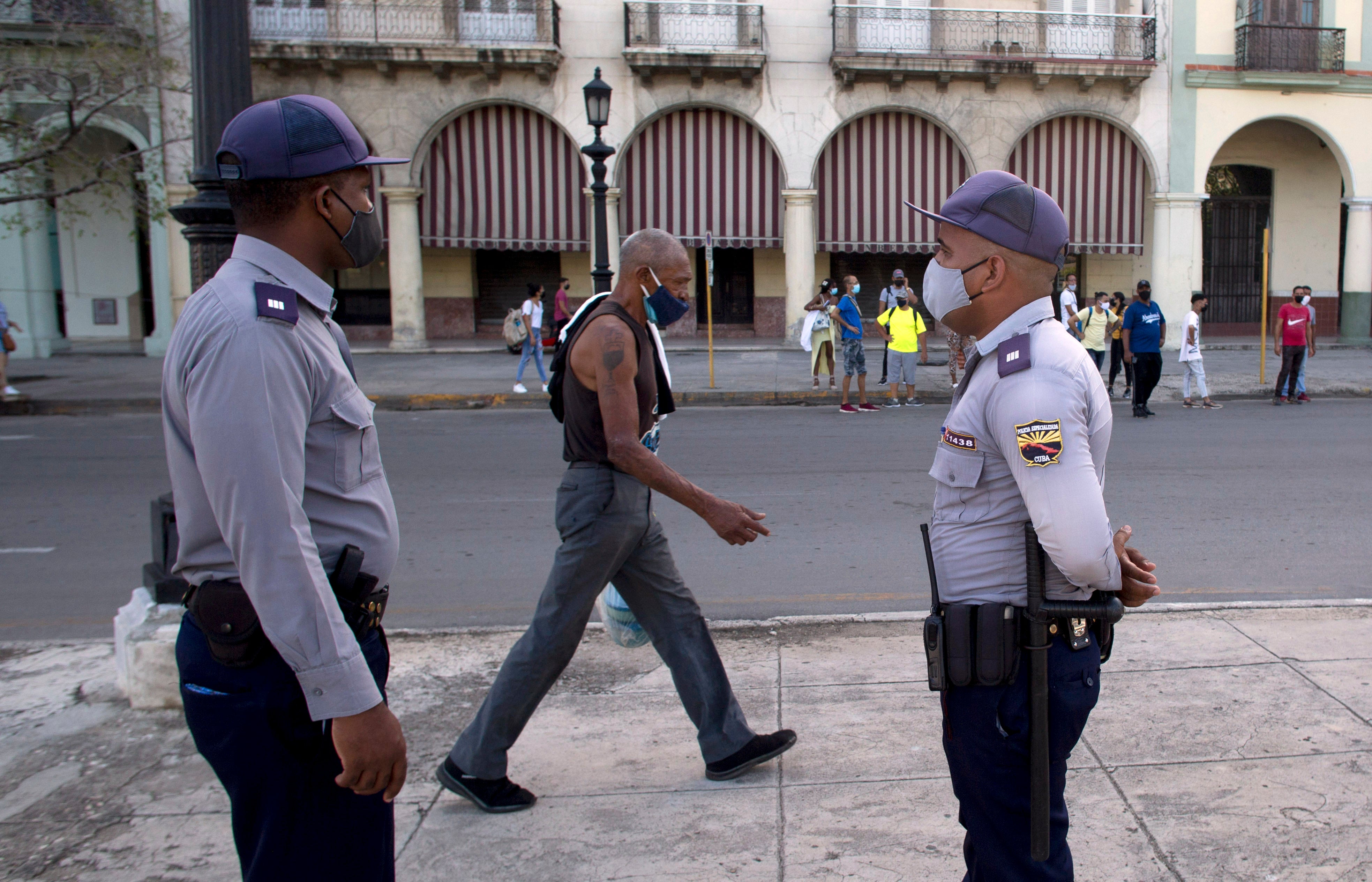Police patrol Havana in large numbers after demonstrations
Large contingents of Cuban police are patrolling the capital of Havana following protests around the island nation against food shortages and high prices amid the coronavirus crisis

Your support helps us to tell the story
From reproductive rights to climate change to Big Tech, The Independent is on the ground when the story is developing. Whether it's investigating the financials of Elon Musk's pro-Trump PAC or producing our latest documentary, 'The A Word', which shines a light on the American women fighting for reproductive rights, we know how important it is to parse out the facts from the messaging.
At such a critical moment in US history, we need reporters on the ground. Your donation allows us to keep sending journalists to speak to both sides of the story.
The Independent is trusted by Americans across the entire political spectrum. And unlike many other quality news outlets, we choose not to lock Americans out of our reporting and analysis with paywalls. We believe quality journalism should be available to everyone, paid for by those who can afford it.
Your support makes all the difference.Large contingents of Cuban police patrolled the capital of Havana on Monday following protests around the island nation against food shortages and high prices amid the coronavirus crisis. Cuba's president said the demonstrations were stirred up on social media by Cuban-Americans in the United States
Many young people took part in the Sunday protests in Havana, which disrupted traffic until police moved in after several hours and broke up the march when a few protesters threw rocks.
That demonstration and others in communities around the tightly controlled country were one of the biggest displays of antigovernment sentiment in decades, and authorities appeared determined to put a stop to it. Internet service was also spotty, possibly indicating an effort to prevent protesters from communicating with each other.
‘’We've seen how the campaign against Cuba was growing on social media in the last weeks,'' President Miguel Díaz-Canel said Monday in a nationally televised appearance in which his entire Cabinet was also present.
‘’That's the way it's done: Try to create inconformity, dissatisfaction by manipulating emotions and feelings,'' Díaz-Canel said.
In a statement, U.S. President Joe Biden said Cuban protesters were asserting their basic rights.
‘’We stand with the Cuban people and their clarion call for freedom and relief from the tragic grip of the pandemic and from the decades of repression and economic suffering to which they have been subjected by Cuba’s authoritarian regime,'' Biden said.
The U.S. urges the Cuban government to serve their people ‘’rather than enriching themselves,'' Biden said.
In the Havana protest, police initially trailed behind as protesters chanted, “Freedom!” “Enough!” and “Unite!” One motorcyclist pulled out a U.S. flag, but it was snatched from him by others.
“We are fed up with the queues, the shortages. That’s why I’m here,” one middle-age protester told The Associated Press. He declined to identify himself for fear of being arrested later.
Later, about 300 pro-government protesters arrived with a large Cuban flag, shouting slogans in favor of the late President Fidel Castro and the Cuban revolution. Some assaulted an AP videojournalist, smashing his camera. AP photojournalist Ramón Espinosa was then beaten by a group of police officers in uniforms and civilian clothes; he suffered a broken nose and an eye injury.
Cuba is going through its worst economic crisis in decades, along with a resurgence of coronavirus cases, as it suffers the consequences of U.S. sanctions imposed by the former President Donald Trump's administration.
An official in the Biden administration tweeted support for Sunday's demonstrations.
“Peaceful protests are growing in #Cuba as the Cuban people exercise their right to peaceful assembly to express concern about rising COVID cases/deaths & medicine shortages. We commend the numerous efforts of the Cuban people mobilizing donations to help neighbors in need,” tweeted Julie Chung, acting assistant secretary of state for Western Hemisphere affairs.
Cuba’s director general for U.S. affairs, Carlos F. de Cossio, dismissed her remarks in his own tweet: “US State Department and its officials, involved to their necks in promoting social and political instability in #Cuba, should avoid expressing hypocritical concern for a situation they have been betting on. Cuba is and will continue to be a peaceful country, contrary to the US.”
The demonstration grew to a few thousand in the vicinity of Galeano Avenue and the marchers pressed on despite a few charges by police officers and tear gas barrages. People standing on many balconies along the central artery in the Centro Habana neighborhood applauded the protesters passing by. Others joined in the march.
Although many people tried to take out their cellphones and broadcast the protest live, Cuban authorities shut down internet service throughout the afternoon.
About 2 1/2 hours into the march, some protesters pulled up cobblestones and threw them at police, at which point officers began arresting people and the marchers dispersed.
AP journalists counted at least 20 people who were taken away in police cars or by individuals in civilian clothes.
“The people came out to express themselves freely, and they are repressing and beating them,” the Rev. Jorge Luis Gil, a Roman Catholic priest, said while standing at a street corner in Centro Habana.
Demonstrations were also held elsewhere on the island, including in the small town of San Antonio de los Banos, where people protested power outages and were visited by Díaz-Canel. He entered a few homes, where he took questions from residents.
Afterward, though, he accused Cuban-Americans of stirring up trouble, capitalizing on discontent over U.S. sanctions that he blamed for shortages of food and other necessities.
“As if pandemic outbreaks had not existed all over the world, the Cuban-American mafia, paying very well on social networks to influencers and Youtubers, has created a whole campaign ... and has called for demonstrations across the country,” Diaz-Canel told reporters.